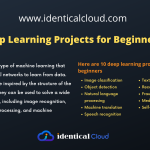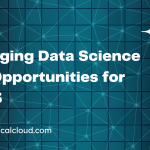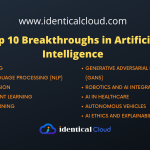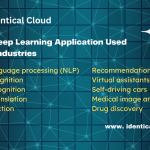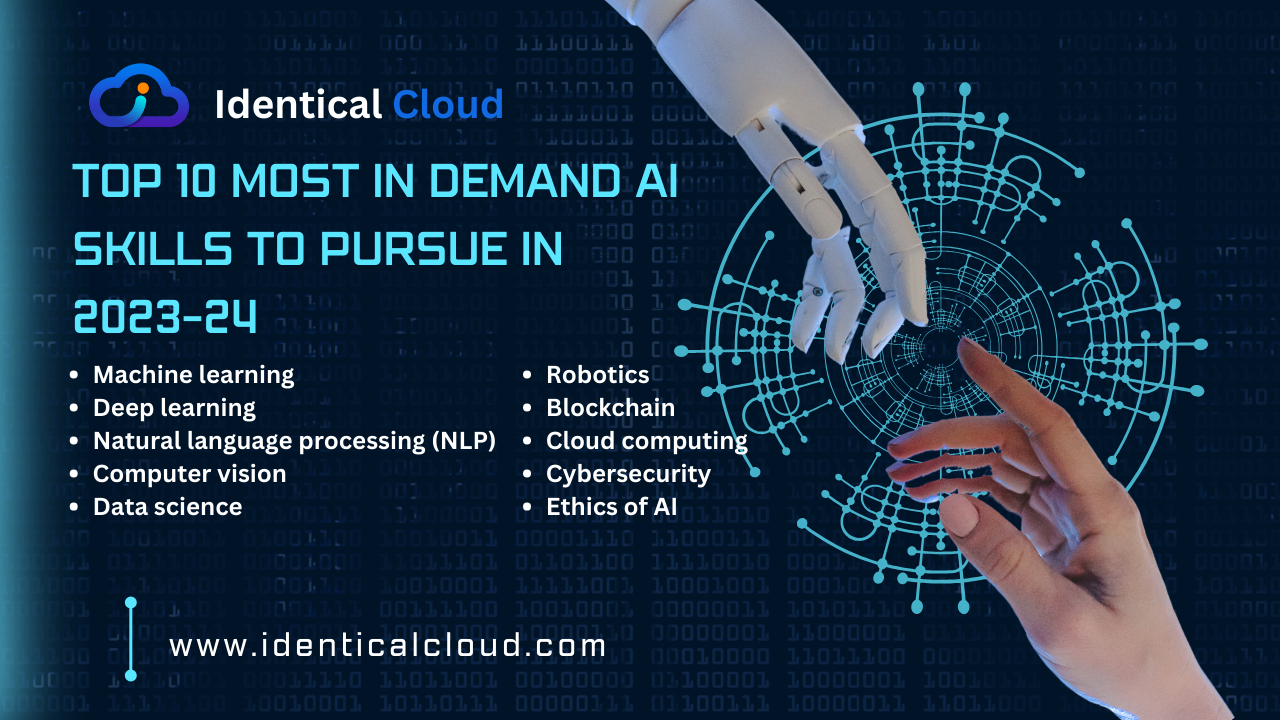
Top 10 most in demand AI skills to pursue in 2023-24
Top 10 most in demand AI skills to pursue in 2023-24
Artificial intelligence (AI) is rapidly changing the world, and the demand for AI skills is growing exponentially. If you are looking for a career in AI, or if you want to stay ahead of the curve in your current role, it is important to learn the most in-demand AI skills.
In this blog post, we will discuss the top 10 most in-demand AI skills to pursue in 2023-24. These skills include machine learning, deep learning, natural language processing, computer vision, data science, robotics, blockchain, cloud computing, cybersecurity, and ethics of AI.
Machine learning
Machine learning algorithms are trained on data, and they can then use that data to make predictions or decisions. The type of data that is used to train machine learning algorithms can vary depending on the application. For example, in fraud detection, the data might include customer transactions, while in spam filtering, the data might include email messages.
There are two main types of machine learning algorithms: supervised learning and unsupervised learning. Supervised learning algorithms are trained on data that has labels, such as fraud or not fraud. Unsupervised learning algorithms are trained on data that does not have labels.
Some of the most common machine learning algorithms include linear regression, logistic regression, decision trees, and random forests.
Deep learning
Deep learning is a subset of machine learning that uses artificial neural networks to learn from data. Neural networks are inspired by the human brain, and they are able to learn complex patterns from data.
Deep learning algorithms are trained on large amounts of data, and they can be used for a variety of tasks, such as image recognition, natural language processing, and speech recognition.
Some of the most common deep learning algorithms include convolutional neural networks (CNNs), recurrent neural networks (RNNs), and transformers.
Natural language processing (NLP)
NLP is the ability of computers to understand and process human language. NLP is used in a wide variety of applications, including chatbots, machine translation, and text analysis.
Some of the most common NLP tasks include text classification, sentiment analysis, and named entity recognition.
Text classification is the task of assigning a label to a piece of text, such as spam or not spam. Sentiment analysis is the task of determining the sentiment of a piece of text, such as positive, negative, or neutral. Named entity recognition is the task of identifying named entities in a piece of text, such as people, places, and organizations.
Computer vision
Computer vision is the ability of computers to see and understand the world around them. Computer vision is used in a wide variety of applications, including self-driving cars, facial recognition, and image classification.
Some of the most common computer vision tasks include object detection, face recognition, and image segmentation.
Object detection is the task of identifying and locating objects in an image. Face recognition is the task of identifying a person’s face in an image. Image segmentation is the task of dividing an image into different parts, such as foreground and background.
Data science
Data science is the field of study that deals with the collection, analysis, and interpretation of data. Data science is used to extract insights from data and make predictions.
Some of the most common data science tasks include data mining, machine learning, and statistical analysis.
Data mining is the process of extracting patterns from data. Machine learning is the process of developing algorithms that can learn from data and make predictions. Statistical analysis is the process of using statistics to analyze data.
Robotics
Robotics is the field of study that deals with the design, construction, and operation of robots. Robots are machines that can perform tasks automatically.
Robotics is a rapidly growing field, and there is a high demand for robotics engineers. Robotics engineers need to have a strong understanding of mechanical engineering, electrical engineering, and computer science.
Some of the most common robotics tasks include object manipulation, path planning, and navigation.
Object manipulation is the task of moving objects with a robot. Path planning is the task of finding a path for a robot to move from one point to another. Navigation is the task of keeping a robot on track.
Blockchain
Blockchain is a distributed ledger technology that is used to record transactions securely and transparently. Blockchain is used in a variety of applications, such as cryptocurrency and supply chain management.
Blockchain engineers need to have a strong understanding of computer science, cryptography, and distributed systems.
Some of the most common blockchain tasks include creating and maintaining blockchain networks, developing blockchain applications, and securing blockchain networks.
Cloud computing
Cloud computing is the delivery of computing services over the internet. It is used to store data, run applications, and develop software.
Cloud computing engineers need to have a strong understanding of computer science, networking, and security.
Some of the most common cloud computing tasks include designing and deploying cloud infrastructures, managing cloud resources, and developing cloud applications.
Cybersecurity
Cybersecurity is the protection of computer systems and networks from unauthorized access, use, disclosure, disruption, modification, or destruction. Cybersecurity is essential to protect data and systems from cyberattacks.
Cybersecurity professionals need to have a strong understanding of computer science, networking, and security.
Some of the most common cybersecurity tasks include identifying and responding to cyberattacks, developing and implementing security policies, and managing security risks.
Ethics of AI
The ethics of AI is the study of the moral and ethical implications of artificial intelligence. It is important to consider the ethical implications of AI before developing and deploying AI systems.
AI ethics professionals need to have a strong understanding of artificial intelligence, ethics, and law.
Some of the most common AI ethics tasks include developing ethical guidelines for AI development, evaluating the ethical implications of AI systems, and educating the public about AI ethics.
These are just some of the most in-demand AI skills. The specific skills that are in demand will vary depending on the industry and the specific role. However, these skills are a good starting point for anyone who wants to pursue a career in AI.
If you are interested in learning more about AI, there are a variety of resources available online and in libraries. You can also take online courses or attend boot camps. With the right skills and training, you can be well on your way to a successful career in AI.

